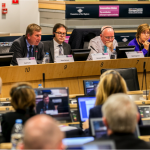Kotka in Finland will host 2014’s first ACSI. An international and multi-disciplinary group will spend three days working with diverse issues around the development of the E-18 Northern Bridge from St Petersburg to Stockholm during a three-day ACSI camp in February 2014. They will develop new perspectives on how to address these issues, take away promising ideas to prototype with important stakeholders, and think about how to move from prototypes to practice. Approximately 30 participants will take part.
This edition of ACSI – the Aalto Camp for Societal Innovation – is part of a process aimed at enhancing the cooperation between three cities in Southern Finland – Helsinki, Turku, and Kotka – along the Stockholm – St. Petersburg development corridor, the “Northern Bridge”, while involving Stockholm and St Petersburg more directly in the process of thinking through opportunities for cross-border cooperation. It is coordinated by Cursor Oy, the regional development company of the Kotka-Hamina Region in Finland.
ACSI is a new generation innovation instrument co-developed by the New Club of Paris. It is a global platform for societal innovation that brings together innovators, field practitioners, researchers, entrepreneurs and students from diverse backgrounds and countries to co-create and test new perspectives and promising ideas that address societal challenges.
This Camp’s challenges are each sponsored by a different city:
- Kotka Challenge: “How can the E-18 Northern Bridge become an environment for facilitating the flow of opportunities from St Petersburg to Stockholm?”
- Helsinki Challenge: “How can the E-18 cooperation area become the most attractive investment zone in Northern Europe?”
- Turku Challenge: “How can we discover, define and develop new markets for maritime companies (technologies, products and services that can be used in many other markets besides the maritime industry)?”
ACSI E-18 Northern Bridge is organized by Cursor Oy in collaboration with Aalto University and the New Club of Paris. The world´s first ACSI camp was initiated by New Club of Paris and Aalto University and prototyped in Finland (2010-2012). ACSI camps have been run in Sweden (2013) and South Africa (2012-13).
Information about ACSI 2013 hosted by Malmö University is available at http://socialinnovation.se/en/news/acsi2013/
Information over ACSI 2010-12 hosted by Aalto University can be found at http://acsi.aalto.fi/en/
For more information about ACSI E-18 Northern Bridge, please contact:
erika.vanhala@cursor.fi , Telephone: +358 40 190 2511


